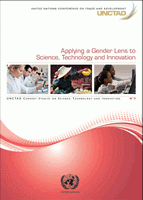
This report was prepared by UNCTAD, with inputs from the Gender Advisory Board of the Commission on Science and Technology for Development (CSTD)
Science, technology and innovation (STI) are beginning to gain greater attention within national and international policy agendas following decades of neglect.
This renewed interest has significant potential to help meet development goals and improve the lives of women and men. Promoting gender equality and ensuring that both men and women benefit from STI policies is fundamental to reducing poverty and ensuring equitable development.
Although there is growing recognition that STI can contribute significantly to promoting development, STI policies generally lack a gender perspective, and therefore do not adequately and equitably address all development concerns.
This report argues that a “gender lens”, which reflects the aims, concerns, situations and abilities of both women and men, should be applied in all aspects of STI policy-making.
Applying a gender lens in STI policies includes promoting and leveraging science and technology (S&T) to support women’s development in key sectors, such as agriculture, water, energy and transport, where they play a particularly important role.
Policies also need to promote gender equality in S&T-related education, careers and leadership as well as encourage and support the role of women in innovation.
Aimed at policymakers, this report draws attention to the importance of policy coherence across programmes and regulations, the relevance of applying evidence-based and participatory approaches, and the need to carryout regular gender-disaggregated monitoring and evaluation.
It also recommends that all STI policies be subject to a gender assessment, and advocates the implementation of concrete policy actions, including making clear financial and resource commitments through gender-responsive budgeting.
This report provides a rich and diverse collection of case studies on good practices and lessons from around the world as a basis for using a gender lens in the analysis, design and implementation of STI policy.
It aims to make a valuable and lasting contribution to improving the effectiveness of STI policy for development by recognizing women’s input and unique needs, and advocating the importance of considering gender in STI policies with the aim of improving both social equity and economic development.
|
Supachai Panitchpakdi |
Sherry Ayittey |
